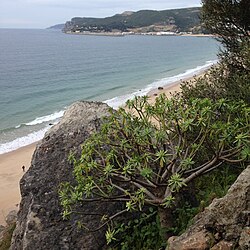Biology:Euphorbia pedroi
| Euphorbia pedroi | |
|---|---|

| |
| Scientific classification | |
| Kingdom: | Plantae |
| Clade: | Tracheophytes |
| Clade: | Angiosperms |
| Clade: | Eudicots |
| Clade: | Rosids |
| Order: | Malpighiales |
| Family: | Euphorbiaceae |
| Genus: | Euphorbia |
| Species: | E. pedroi
|
| Binomial name | |
| Euphorbia pedroi Molero & Rovira
| |
Euphorbia pedroi (known in Portuguese as eufórbia-de-gomes-pedro or tabaíba-do-espichel) is a species of flowering plant in the spurge family endemic to the Arrábida Natural Park in Portugal. It is part of section Aphyllis, a mostly African and Macaronesian clade, being the only member of its section native to Europe.[3] Its binomial name is dedicated to José Gomes Pedro (1915-2010) a Portuguese botanist, who studied the flora and vegetation of Arrábida and Mozambique.[4]
Description
Euphorbia pedroi is a sub-succulent shrub that can reach 2 m (6.6 ft) tall.[1] Leaves are 25 mm–60 mm × 4 mm–10 mm (0.98 in–2.36 in × 0.16 in–0.39 in), green or somewhat glaucous. Cyathium is 2.8–4 mm (0.11–0.16 in) with a 1–3 mm (0.039–0.118 in) peduncle, glabrous or slightly hairy both in the base and peduncle. Fruit is 4.2 mm–5 mm × 5.8 mm–7.2 mm (0.17 in–0.20 in × 0.23 in–0.28 in) yellowish-green or reddish, seeds are reddish brown, 2.8 mm–3.2 mm × 2 mm–2.3 mm (0.110 in–0.126 in × 0.079 in–0.091 in) and somewhat dorsiventrally flattened.[5]
Distribution and habitat
Euphorbia pedroi is native to the Arrábida Natural Park, specifically between Cabo Espichel and Sesimbra on the Setúbal Peninsula, in the Atlantic coast. It is found on slopes of south-facing limestone cliffs on incipient soils or rock cracks subjected to regular mist and strong winds.[1][4]
References
- ↑ 1.0 1.1 1.2 Carapeto, A.; Monteiro-Henriques, T.; da Silva Menezes de Sequeira, M.P.; Rivers, M.C. (2017). "Euphorbia pedroi". IUCN Red List of Threatened Species 2017: e.T96430454A96430470. doi:10.2305/IUCN.UK.2017-3.RLTS.T96430454A96430470.en. https://www.iucnredlist.org/species/96430454/96430470. Retrieved 19 November 2021.
- ↑ "Appendices | CITES". https://cites.org/eng/app/appendices.php.
- ↑ Barres, Laia; Vilatersana, Roser; Molero, Julià; Susanna, Alfonso; Galbany-Casals, Mercè (June 2011). "Molecular phylogeny of Euphorbia subg. Esula sect. Aphyllis (Euphorbiaceae) inferred from nrDNA and cpDNA markers with biogeographic insights". Taxon 60 (3): 705–720. doi:10.1002/tax.603007. https://www.researchgate.net/publication/221672463. Retrieved 10 January 2023.
- ↑ 4.0 4.1 "Euphorbia pedroi Molero & Rovira". Flora-on. https://flora-on.pt/#/1Euphorbia+pedroi.
- ↑ "E. pedroi". Flora Iberica. http://www.floraiberica.es/floraiberica/texto/pdfs/08_108_06%20Euphorbia.pdf.
Wikidata ☰ Q5851823 entry
 |


